Daily Vocabulary Words: List of Daily Used Words in Leading International Newspapers
Hi there. Welcome to this special section @ Wordpandit.
Our endeavour here is very simple: to highlight important daily vocabulary words, which you would come across in leading newspapers in the country. We have included the following newspapers in our selection:
• The New York Times
• The Washington Post
• Scientific American
• BBC
• The Guardian
• Psychology Today
• Wall Street Journal
• The Economist
We are putting in extensive work for developing your vocabulary. All you have got to do is be regular with this section and check out this post on a daily basis. This is your repository of words that are commonly used and essentially, we are posting a list of daily used words. Hence, this has significant practical application as it teaches you words that are used commonly in leading publications mentioned above.
Visit the website daily to learn words from leading international newspapers.
WORD-1: Marginally
CONTEXT: TikTokers are not necessarily statistically trained, and often focus on the marginally increased breast cancer risk from the combined pill – offset anyway by its protection against ovarian and womb cancer.
SOURCE: Guardian
EXPLANATORY PARAGRAPH: When you add just a tiny bit of sugar to your cereal to make it a little sweet, you are adding it “marginally.” It means you’re doing something just a little bit, not a lot.
MEANING: Slightly or to a small extent (adverb).
PRONUNCIATION: MAHR-juh-nuh-lee
SYNONYMS: slightly, minimally, barely, narrowly, just
USAGE EXAMPLES:
1. The new movie was only marginally better than the last one.
2. She passed the exam marginally.
3. His work has improved marginally since last semester.
4. Marginally adjusting the temperature can make the room more comfortable.
5. The costs have increased marginally this year.
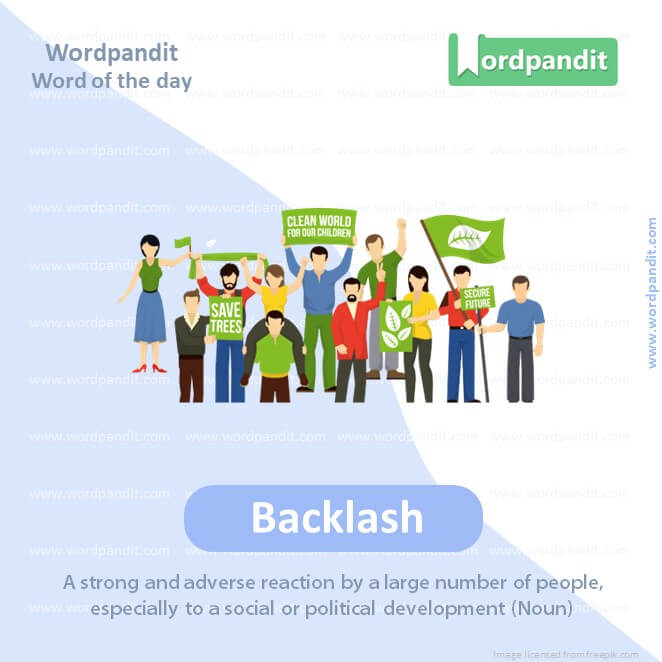
WORD-2: Backlash
CONTEXT: If your blood pressure rises at the thought of a doll who sits down, may I humbly suggest you consider time with a therapist?) And yet any backlash from bigoted adults feels insignificant compared with the significance of diverse toys for children.
SOURCE: Guardian
EXPLANATORY PARAGRAPH: Imagine if you tried to take a toy from your friend, and they got upset and wouldn’t talk to you anymore. That upset reaction from your friend is like a “backlash.” It’s when people react strongly because they don’t like something that was done.
MEANING: A strong and adverse reaction by a large number of people, especially to a social or political development (Noun).
PRONUNCIATION: BAK-lash
SYNONYMS: repercussion, fallout, counterreaction, backlash, response
USAGE EXAMPLES:
1. There was a big backlash when the new rules were introduced.
2. He faced a lot of backlash for his comments on social media.
3. The company tried to avoid any backlash from their customers.
4. The policy change triggered a backlash among the community.
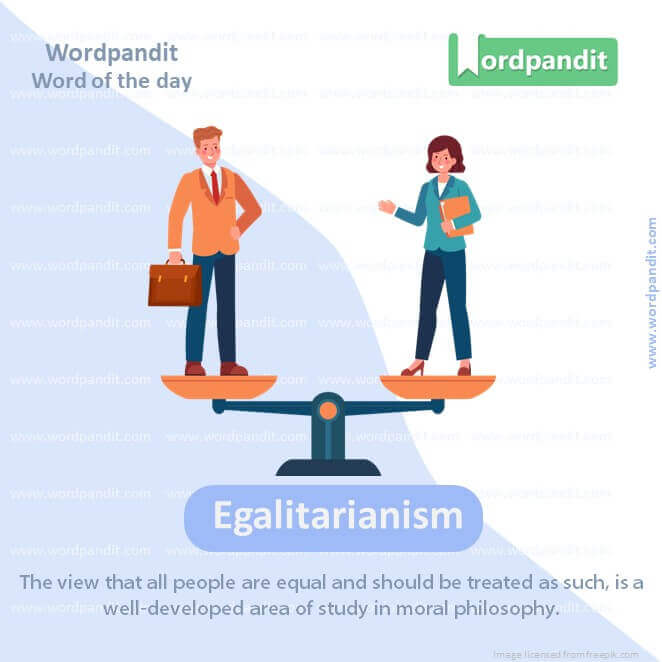
WORD-3: Egalitarianism
CONTEXT: My general rule is that egalitarianism won’t be achieved by anything you can buy in John Lewis.
SOURCE: Guardian
EXPLANATORY PARAGRAPH: Think about when everyone in your class gets the same size of cake. That’s what “egalitarianism” is about. It means everyone is treated the same and gets the same fair treatment, no one is more important than anyone else.
MEANING: A belief in human equality, especially in social, political, and
economic affairs (Noun) .
PRONUNCIATION: ee-gal-i-TAIR-ee-uh-niz-um
SYNONYMS: fairness, equality, impartiality, even-handedness, equity
USAGE EXAMPLES:
1. Her belief in egalitarianism made her a strong supporter of equal rights.
2. The new law was based on principles of egalitarianism.
3. Egalitarianism was a key topic in the debate.
4. He argued for egalitarianism in the workplace.
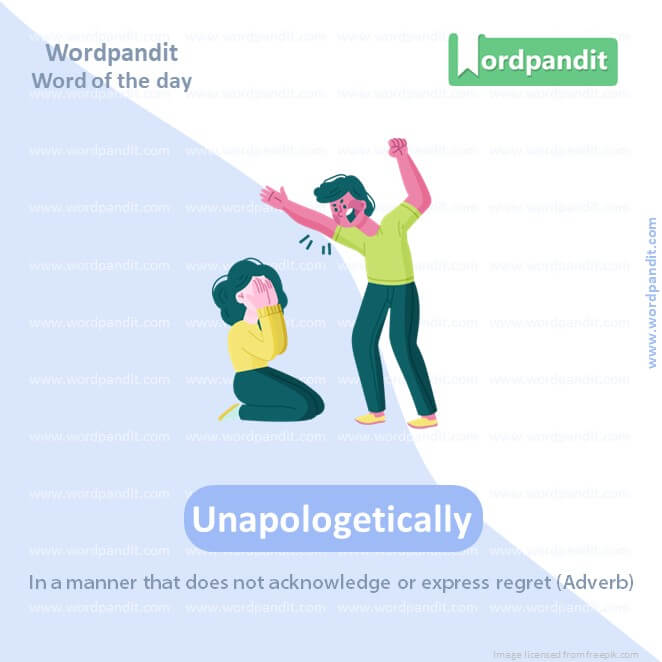
WORD-4: Unapologetically
CONTEXT: She was unapologetically joyous and fun – and she knew how to accessorise.
SOURCE: Guardian
EXPLANATORY PARAGRAPH: When you are really proud of your drawing and show it to everyone without feeling shy, you are being “unapologetically” proud. It means you do something without saying sorry because you believe it’s the right thing to do.
MEANING: In a manner that does not acknowledge or express regret (Adverb).
PRONUNCIATION: uhn-uh-pahl-uh-JET-ih-klee
SYNONYMS: boldly, confidently, proudly, openly, plainly
USAGE EXAMPLES:
1. She spoke unapologetically about her opinions.
2. He lives his life unapologetically.
3. They unapologetically supported the controversial decision.
4. She danced unapologetically in the rain.
WORD-5: Preschool
CONTEXT: The trees seem to be covered in icing. I hold my five-year-old boy’s hand and lead him to the car. We are on our way to preschool.
SOURCE: Guardian
EXPLANATORY PARAGRAPH: Preschool is like a big playroom where you go before you start kindergarten. You play with toys, sing songs, and learn about numbers and letters with other kids your age.
MEANING: An educational institution for children too young for elementary school (noun).
PRONUNCIATION: PREE-skool
SYNONYMS: nursery school, pre-K, kindergarten, playgroup, early learning center
USAGE EXAMPLES:
1. She made a lot of friends in preschool.
2. He learned to read in preschool.
3. The preschool organizes many fun activities.
4. Their daughter is excited to start preschool next week.
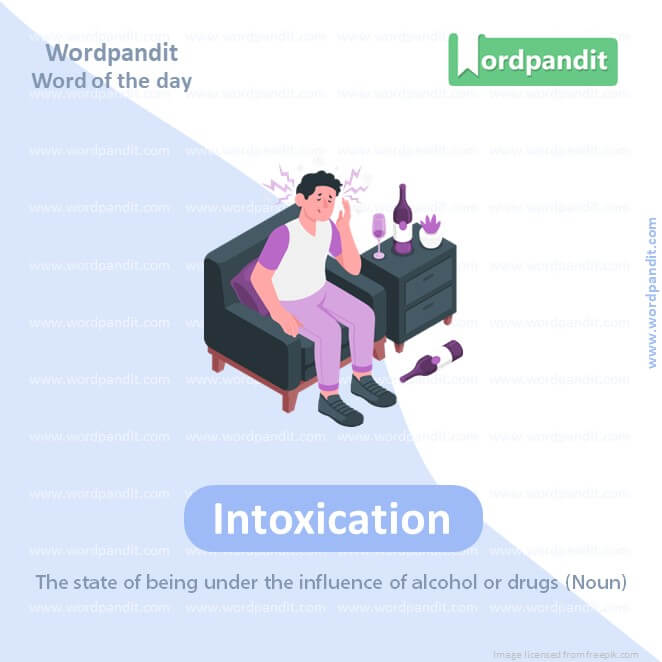
WORD-6: Intoxication
CONTEXT: In my intoxication the world opened up to me and I wanted more.
SOURCE: Guardian
EXPLANATORY PARAGRAPH: Intoxication is like when someone has too much candy and feels all funny and dizzy, except it happens to grown-ups when they drink too much of something called alcohol. It makes them act silly and not like themselves.
MEANING: The state of being under the influence of alcohol or drugs (Noun).
PRONUNCIATION: in-tok-si-KAY-shun
SYNONYMS: drunkenness, inebriation, tipsiness, stupor, impairment
USAGE EXAMPLES:
1. The driver was arrested for intoxication.
2. Intoxication can lead to poor decision-making.
3. They warned us about the dangers of intoxication at the party.
4. The festival had strict rules to manage alcohol consumption and prevent intoxication.
WORD-7: Seductive
CONTEXT: a seductive combination for someone who wanted to be seen but didn’t dare to reveal his true self.
SOURCE: Guardian
EXPLANATORY PARAGRAPH: Imagine if someone has a really pretty and shiny toy, and it makes you want to play with it—that’s a bit like “seductive.” It’s when something or someone looks so interesting or nice that it draws you in and you really want to be near it or them.
MEANING: Tempting and attractive; enticing (adjective).
PRONUNCIATION: suh-DUK-tiv
SYNONYMS: alluring, tempting, enticing, captivating, beguiling
USAGE EXAMPLES:
1. The advertisement was seductive and caught everyone’s attention.
2. He gave her a seductive look that made her blush.
3. The seductive qualities of the movie made it very popular.
4. The seductive aroma of freshly baked cookies filled the kitchen.
WORD-8: Companionship
CONTEXT: The alcohol that had once been my gateway to companionship was now leading me into isolation.
SOURCE: Guardian
EXPLANATORY PARAGRAPH: Companionship is like when you have a buddy to play with, talk to, and share your toys. It means having a friend around so you don’t feel lonely.
MEANING: The feeling of friendship or fellowship; the company of others (noun).
PRONUNCIATION: kuhm-PAN-yuhn-ship
SYNONYMS: friendship, company, fellowship, association, camaraderie
USAGE EXAMPLES:
1. The old man enjoyed the companionship of his dog.
2. She sought companionship in various social clubs.
3. Companionship is important for everyone’s well-being.
4. They formed a strong companionship during their travels.
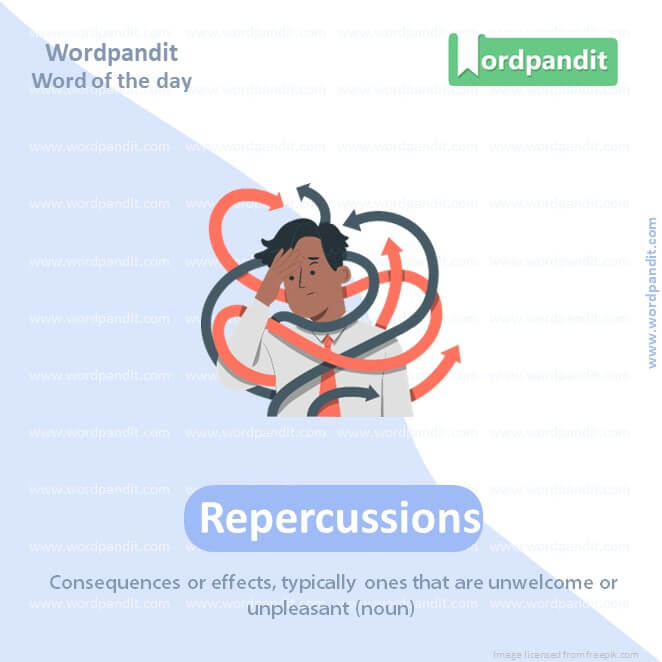
WORD-9: Repercussions
CONTEXT: the repercussions began to hit harder, I lost control.
SOURCE: Guardian
EXPLANATORY PARAGRAPH: If you throw a ball really hard against the wall, it bounces back at you—that’s like “repercussions.” It means the effects or outcomes that happen because of something you did.
MEANING: Consequences or effects, typically ones that are unwelcome or
unpleasant (noun).
PRONUNCIATION: ree-pur-KUH-shuns
SYNONYMS: consequences, outcomes, effects, results, fallout
USAGE EXAMPLES:
1. The decision had serious repercussions for the company.
2. He didn’t realize the repercussions of his actions until it was too late.
3. The economic policy had widespread repercussions.
4. There were positive repercussions from the community’s efforts to improve.
WORD-10: Clementine
CONTEXT: In the passenger seat my boy is eating his ham sandwich and a clementine.
SOURCE: Guardian
EXPLANATORY PARAGRAPH: A clementine is a small fruit that looks like a tiny orange. It’s sweet and easy to peel, and you can eat it in little sections. It’s a tasty snack that you might have at lunch or after dinner.
MEANING: A small, sweet variety of orange with a thin, loose skin (noun).
PRONUNCIATION: KLEM-en-teen
SYNONYMS: mandarin, tangerine, citrus fruit, sweet orange
USAGE EXAMPLES:
1. She packed a clementine in her lunchbox.
2. Clementines are in season during the winter.
3. He enjoyed eating a clementine after his meal.
4. They bought a bag of clementines to share.
Vocabulary Meaning and Examples
In the fascinating world of language learning, a method particularly impactful is learning ‘vocabulary meaning and examples’. Harnessing this dual approach of understanding words through definitions and relevant examples yields a sound vocabulary grasp. Let’s explore how we can effectively learn vocabulary using ‘meaning and examples’.
Foremost, recognizing ‘meaning and examples’ involves more than just a surface glance at the definition. It requires an engaged interaction with the word, placing it within a proper context. This enriches comprehension and facilitates an innate understanding of the word’s applications.
The process of learning ‘meaning and examples’ is made highly effective through varied resources. Reading literature, online articles, and language learning platforms offer numerous examples enriching the meanings. By frequently encountering a word in various contexts, the understanding of the ‘meaning and examples’ deepens, imprinting the word into long-term memory.
When learning ‘meaning and examples’, creating personal sentences is recommended. Develop your own examples using the given word. This personal connection between learned vocabulary and your everyday life context strengthens both familiarity and recall.
Moreover, taking notes while studying ‘meaning and examples’ goes a long way in mastering vocabulary. Jotting down the definition and a couple of examples for reference leads to better recall during revisions.
Finally, teach to learn. A tried-and-true method to solidify ‘meaning and examples’ is by explaining the word to someone else. This exercise forces you to articulate the word’s usage and understanding clearly, embedding it further in your memory.
In conclusion, the journey to learn ‘vocabulary meaning and examples’ is a rewarding process that involves a multifaceted approach. As you dive into the rich experience of understanding words through ‘meaning and examples’, you uncover the nuance and depth of language, enabling you to master it in its true sense.













